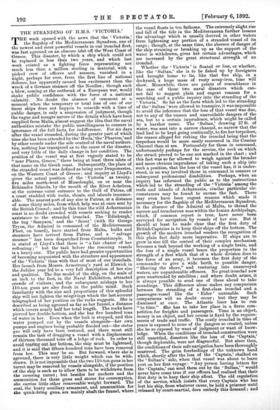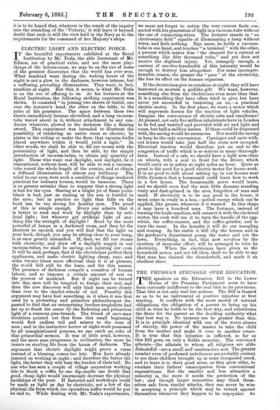'111/1 STRANDING OF H.M.S.
" near Platea, Greece," there being at least three islets of this fact was so far allowed to weigh against the broader that name on the Greek coast. Subsequently, the place of and more obvious imprudence of taking such a ship into the stranded vessel was defined as being near Dmgomestre, such a position, that the loss of the vessel has, it is under- on the Western Coast of Greece ; and inquiry at Lloyd's stood, in no way involved those in command in censure or gives the actual position of the Victoria' as twenty- subsequent professional disabilities. Perhaps, when an five miles north-west of Missolonghi, on or near the inquiry has informed the public as to the instructions Echinades Islands, by the mouth of the River Achelous, which led to the stranding of the ' Victoria' among the at the extreme outer entrance to the Gulf of Patras, off reefs and islands of Acharnania, similar particular cir- a coast studded with rocks, shoals, and islands innumer- cumstances may be found to excuse the fact. There able. The nearest port of any size is Patras, at a distance may even have been cogent reasons which made it of some thirty miles, from which help was at once sent by necessary for the flagship of the Mediterranean Squadron, the British Consul ; and by this time the wild Acharnanian in the absence of the Admiral at Malta, to thread the coast is no doubt crowded with vessels seeking to render narrow and treacherous seas within the Ionian Archipelago, assistance to the stranded ironclad. The ' Edinburgh,' which, if common report is true, have never been the tug ' Sampson,' and the Scout' (with Sir George surveyed for navigation by vessels of her size. But it Tryon, the Admiral in command of the Mediterranean should at least be made clear that the first duty of Fleet, on board), have started from Malta, hulks and British Captains is to keep their ships off the bottom. The steamers have arrived from Patras, and a " salvage growth of the modern ironclad renders the recognition of steamer " has been despatched from Constantinople. It this plain fact daily more imperative. If ships are to is stated at Lloyd's that there is " a fair chance of her grow in size till the control of their complex mechanism refloating ; " but the task before the rescuing vessels becomes a task beyond the working of a single brain, and is a heavy one. The public have had greater opportunities the loss of a single vessel bears the proportion to the of becoming acquainted with the structure and appearance strength of a fleet which that of a whole division does to of the ' Victoria' than with that of most of our ironclads. the force of an army, it becomes the first duty of the Her launch from Messrs. Armstrong's yard at Elswick in commander to give a wide berth to possible danger. the Jubilee year led to a very full description of her size " Shaving the shore," and venturing into unsurveyed and qualities. The fine model of the ship, on the scale of waters, are unpardonable offences. No great ironclad now an inch to the foot, in the Naval Exhibition, attracted goes unattended by satellites ; and where doubt arises, it crowds of visitors ; and the subsequent mishaps to her is always possible to send one of these ahead to take 110-ton guns are also fresh in the public mind. Such soundings. This difference alone makes any comparison familiarity with the size and proportions of this splendid between the stranding of a first-class ironclad and a ship will not lighten the misgivings which the last account passenger-vessel like the Eider' untenable. Such telegraphed of her position on the rocks suggests. She is comparisons will no doubt occur ; but they may be described as being aground as far as her funnel, a distance dismissed at once. The Atlantic liner has to run which covers nearly half her total length. The rocks have "to time." She has to take her place in a fierce com- pierced her double-bottom, and she has five hundred tons petition for freights and passengers. Time is an object, of water in her. Even when the leak is stopped, and this money is an object, and her course is fixed by the require- water pumped out by the vessels alongside—her own ments of trade and traffic. The costly ironclad in time of pumps and engines being probably flooded out—the status peace is exposed to none of the dangers so created, unless quo will only have been restored, and there must still she be so exposed by want of judgment or want of know- remain the task of dragging a vessel with a displacement ledge. When the conditions of ironclad-construction were of thirteen thousand tons off a ledge of rock. In order to still unsettled, disasters like the loss of the 'Captain,' avoid tearing out her bottom, the ship must be lightened, though deplorable, were not disgraceful. But since then, and it is said that fifteen hundred tons have been removed the conditions of their safe navigation have been thoroughly from her. This may be so. But forward, where she is mastered. The grim forebodings of the unknown hand aground, there is very little weight which can be with- which, shortly after the loss of the Captain,' chalked on drawn. It is not impossible that the two 110-ton guns in her the ' Sultan's ' side, when that vessel was about to leave turret may be removed by vessels alongside, if the position port on her first voyage : "Any person having letters for of the ship is such as to allow them to be withdrawn from the Captain,' can send them out by the ' Sultan," would the covering turret ; but besides her anchors and the never have come true if our officers had realised that their ammunition for these guns and stores for consumption, first duty is to keep their ship afloat. The old regulation she carries little other removeable weight forward. The of the service, which insists that every Captain who has coal, the heavy auxiliary armament, and ammunition for lost his ship, from whatever cause, be held a prisoner until the quick-firing guns, are mainly abaft the funnel, where released by court-martial, does embody this demand ; and the vessel floats in ten fathoms. The extremely slight rise VICTORIA.' and fall of the tide in the Mediterranean further lessens THE week opened with the news that the Victoria,' the advantage which is usually derived in other waters the flagship of the Mediterranean Squadron, one of from lightening any portion of a stranded vessel of its the newest and most powerful vessels in our ironclad fleet, cargo ; though, at the same time, the absence of danger of was fast aground on an obscure islet off the West Coast of the ship straining or breaking up as the support of the Greece. This disaster, by which a ship which could not water is withdrawn, gives her certain advantages, which be replaced in less than two years, and which last are increased. by the great structural strength of an week existed as a fighting force representing not ironclad. much less than a million sterling in material, with a Whether the • Victoria' is floated or lost, or whether, picked crew of officers and seamen, vanished in a like the Sultan,' she is to be fished up by foreigners night, perhaps for ever, from the first line of national and brought home to lie, like that fine ship, in a defence, has apparently caused less excitement than the dockyard, a huge mass of rusty scrap-iron, time will wreck of a German steamer off the Needles ; though such show. Meanwhile, there are points of resemblance in a blow, coming at the outbreak of a European war, would the case of these two naval disasters which can- shake public confidence with the force of a national not fail to suggest plain and cogent reasons for a calamity. No doubt the absence of comment at a searching and a public inquiry into the stranding of the moment when the temporary or total loss of one of our Victoria.' So far as the facts which led to the stranding finest ships does not happen to coincide with a time of of the ' Sultan ' were allowed to transpire, it was impossible public danger, is only a suspension of judgment, though to avoid the inference that the loss of that vessel was due, the vague and meagre nature of the details which have been not to any of the unseen and unavoidable dangers of the supplied from Malta, almost suggest the idea that the naval sea, but to a certain imprudence, which might be called authorities mistake the public unwillingness to censure in by a harsher name. The Sultan,' drawing 27 ft. of ignorance of the full facts, for indifference. For six days water, was sent into a narrow channel, so narrow that the after the vessel stranded, during the greater part of which lead had to be kept going continually, to fire her torpedoes, time she has been attended by the' Hecla,' the 'Phaeton,'and the reason alleged for risking the ironclad being that the by other vessels under the sole control of the naval authori- torpedoes would be more easily recovered in the Comino ties, nothing has transpired as to the cause of the disaster, Channel than at sea. Fortunately for those in command, and very little of the daily change in her condition. The unfortunately perhaps for the service, the rock on which position of the vessel was at first vaguely stated to be she struck proved to be one not marked in the chart ; and it is to be hoped that, whatever is the result of the inquiry into the stranding of the ' Victoria,' it will leave it beyond doubt that such is still the view held in the Navy as to the requirements for the command of her Majesty's ships.







































 Previous page
Previous page